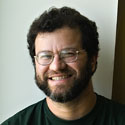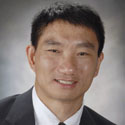Advisory Board and Editors Infectious Diseases

Timothy P Driscoll
Associate Professor at West Virginia University Department of Biology. PhD in Genomics, Bioinformatics, and Computational Biology from Virginia Tech. Our research centers on the distribution, evolution, and design of interventions for zoonotic and vector-borne infectious diseases. I focus on Rickettsiales and other intracellular pathogens, using phylogenomics and related approaches to understand virulence and pathogenicity.

Jonathan A Eisen
Full Professor, University of California, Davis (Depts. of Medical Microbiology and Immunology and Evolution and Ecology) and Adjunct Scientist DOE Joint Genome Institute.
Obsessed with microbes, the Redsox, open science, and STEM diversity.

Ibrahim Elsohaby
Dr. Ibrahim Elsohaby is Assistant Professor in the Department of Infectious Diseases and Public Health and City University of Hong Kong. His current research investigates the One Health epidemiology of infectious and zoonotic diseases, including antimicrobial resistance. The aim of this research is to use epidemiologic and quantitative methods to develop realistic antimicrobial stewardship strategies based on a One Health approach and to reduce the risk of zoonotic diseases transmission to human contacts and general public.

Marcelo U. Ferreira
Prof. Marcelo Ferreira is a medical parasitologist with over 20-year experience in field-oriented and laboratory research. He graduated in Medicine from the University of São Paulo, Brazil (1988), where he was trained in Internal Medicine (1999-2004) and obtained his MSc (1993) and PhD (1997) degrees. Further research training was obtained in Japan (Nagoya University, 1995-97) and the United States (Harvard University, 2005-06). He teaches medical parasitology at the University of São Paulo since 1990 and currently serves as a member of the Technical Advisory Committee on Malaria of the Pan-American Health Organization.

B. Brett Finlay
The Peter Wall Distinguished Professor of the University of British Colombia. Recipient of several awards including the E.W.R. Steacie Prize, the CSM Fisher Scientific Award, an MRC Scientist, five Howard Hughes International Research Scholar Awards, a CIHR Distinguished Investigator, BC Biotech Innovation Award, the Michael Smith Health Research Prize, the IDSA Squibb award, the Jacob Biely Prize. Cofounder of Inimex Pharmaceuticals, Inc., and Director of the SARS Accelerated Vaccine Initiative

Suzanne M.J. Fleiszig
Professor, University of California, Berkeley. Programs in Optometry, Vision Science, Infectious Disease and Immunity, and Microbiology. Vice President, Tear Film and Ocular Surface Society. Former President, International Society for Contact Lens Research. Councillor, American Society for Microbiology. Recipient of the 2005 Glenn A. Fry Award and the 2010 Korb Award. Editorial Boards: PLoS ONE, Infection & Immunity, and Investigative Ophthalmology & Vision Science.

Mario Alberto Flores-Valdez
Dr. Mario Alberto Flores-Valdez is a Professor in the Medical and Pharmaceutical Biotechnology Unit, CIATEJ, A.C., Guadalajara, Jalisco, Mexico (2007-present). He is a member of the National System of Researchers (SNI), and a member of the Mexican Academy of Sciences. He was a Stanford University Medical Center postdoctoral fellow (2004-2007), where he received a Dean's Fellowship Award (2006) to conduct research on Tuberculosis. He worked in UNAM as Research Assistant for Prof. Jaime Mora (2004) and Prof. Emundo Calva (2003). He has received a Ph.D. in Biochemistry from UNAM (1999-2003), a M.Sc. in Molecular Biology and Genetic Engineering from UANL (1996-1999) and a B.Sc. from Universidad de Sonora (1991-1996) in Chemistry and Biology. He received fellowships from CONACYT for M.Sc. and Ph.D. studies and in M.Sc. and B.Sc. has received Diplomas as Best Student. He has expertise in Tuberculosis, particularly in developing recombinant BCG strains. He has been PI for 7 grants from 2008 to date, focused in studies about tuberculosis vaccine development and basic aspects of mycobacterial physiology.

Simon DW Frost
Reader in Pathogen Dynamics at the University of Cambridge; formerly Adjunct Associate Professor in the Dept. of Pathology, University of California San Diego (UCSD). Graduated with a BA in Natural Sciences (1st class), Trinity College, Cambridge (1992), DPhil in Mathematical Biology, Merton College, Oxford (1996). Postdoctoral positions at Princeton University, Oxford University, University of Edinburgh and UCSD. Awards include: NATO Postdoctoral Fellowship (1996), MRC Nonclinical Training Fellowship (1997-2000), a Royal Society Wolfson Research Merit Award (2008-2013), and Thomson-Reuters Highly Cited Researcher awards in 2014, 2015, and 2016.

Kazumichi Fujioka
I received my medical degree from Kobe University in 2004. I completed my internship at Hyogo Prefectural Awaji Hospital, my pediatric residency at Kakogawa Municipal Hospital, and my fellowship in Neonatal-Perinatal Medicine at Kobe University Hospital and Kobe Children’s Hospital.
In parallel with my clinical training, I also received basic research training with a focus on the pathophysiology of neonatal diseases, first as a Postgraduate student at Kobe University, and then as a Postdoctoral scholar in the Dept of Pediatrics at Stanford University School of Medicine.
Throughout my Postgraduate training, I have been engaged in a wide range of clinical research projects, including two main projects: the ”Contribution of Genetic Polymorphisms of Vascular Endothelial Growth Factor to Bronchopulmonary Dysplasia” and the “Regulation of Renin-Angiotensin Systems in the Monochorionic Twin Pregnancies Complicated by Twin-to-Twin Transfusion Syndromes”. During my fellowship at Stanford, my research focus was to understand the function of heme oxygenase (HO), the rate-limiting enzyme in bilirubin production, and its contribution to neonatal diseases, specifically neonatal hyperbilirubinemia and sepsis, using animal models. I currently serve as an Associate Professor of Pediatrics at Kobe University Graduate School of Medicine as well as Chief of Neonatology at Kobe University Hospital.

Shou-Jiang (SJ) Gao
Dr. Gao is a Professor and Director of the Cancer Virology Program at the Hillman Cancer Center and in the Department of Microbiology and Molecular Genetics in the University of Pittsburgh School of Medicine.
Dr. Gao is an Elected Fellow of the American Academy of Microbiology. He currently serves as the Editor-In-Chief for the Journal of Medical Virology, Section Editor for PLoS Pathogens, and Academic Editor for PLoS One and PeerJ. He is also serving on the Editorial Boards of over 10 peer-reviewed journals including Journal of Virology, Journal of Antivirals & Antiretrovirals, Journal of Molecular Biomarkers and Diagnosis, Journal of Microbial & Biochemical Technology, Sarcoma Research International, Oncolytic Virotherapy, etc.

Nicholas Geard
I am am a computer scientist with over 10 years experience in modelling the spread and control of infectious diseases. I obtained mys PhD in computer science from the University of Queensland in 2016. Following 3 years of postdoctoral research in the UK, I joined the Melbourne School of Population and Global Health in 2011, where I was awarded an ARC Discovery Early Career Researcher Award. I joined the School of Computing and Information Systems in 2016, where I am an Associate Professor leading a group of 6 postdoctoral and PhD researchers. I am also Director of the Melbourne Data Analytics Platform (MDAP), a team of 20 data scientists who provide cross-disciplinary support on computing and data-intensive research across the University of Melbourne.

Joseph J Gillespie
Dr. Gillespie is an evolutionary biologist with broad interests in organismal and molecular evolution. The major focus of his current research is deciphering the mechanisms by which obligate intracellular species of Rickettsiales (Alphaproteobacteria) invade, survive and replicate within eukaryotic cells.
In research funded by the National Institutes of Health, Dr. Gillespie utilizes phylogenetics, comparative genomics and bioinformatics to guide experimental research on various pathogenic species of Rickettsia and their associated arthropod vectors. His early research resulted in the reclassification of Rickettsia species and the identification of many lineage-specific pathogenicity factors. Through years of intense scrutinization of dozens of diverse rickettsial genomes, Dr. Gillespie and colleagues have described a large, dynamic mobilome for Rickettsia species, resulting in the identification of integrative conjugative elements as the vehicles for seeding Rickettsia genomes with many of the factors underlying obligate intracellular biology and pathogenesis. Via an iterative process of genome sequencing, phylogenomics, bioinformatics, and classical molecular biology and microbiology, Dr. Gillespie continues to lead and assist research projects on the characterization of rickettsial gene and protein function, as well as the description of cell envelope glycoconjugates.

